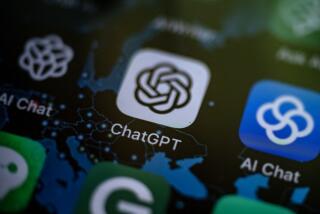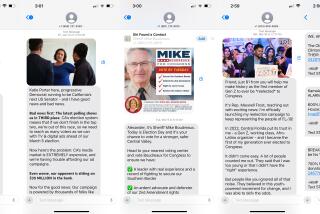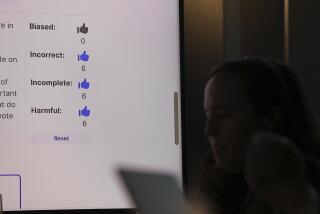Facebook helps get out the vote
Finally, scientists have documented that spending time on Facebook isn’t all about posting pictures of cute kids and running virtual farms — it can actually be useful to American society.
A single election day message, sent to more than 60 million users of the social networking site, increased turnout in the November 2010 congressional election by 340,000 votes, researchers reported Wednesday.
It may not sound like much, but in a close election — such as Florida’s contested presidential vote in 2000 — that kind of bump could make the difference between a win and a loss, said UC San Diego social network researcher James Fowler, leader of the unusual experiment.
Fowler said that his team’s study, published in the journal Nature, was the first to prove that activity on huge online social networks can affect consequential, real-world behavior. Tellingly, the get-out-the-vote message was most persuasive when it was passed along by close friends.
“There are tons of Twitter studies showing you can spread emotions,” he said. “But here we have a third of a million people who did something very important” because of a one- or two-sentence online message.
“Without voting, we have no democracy,” Fowler added.
Facebook’s usual get-out-the-vote effort includes a banner with a short message accompanied by pictures of friends who said they had gone to the polls. That message was displayed to more than 60 million Facebook users who were deemed eligible to vote in the U.S.
But for the sake of the experiment, Fowler and collaborators at UCSD and the Menlo Park social network company crafted a watered-down version of the message that did not include the faces of friends who had voted and posted it to 611,044 users. An additional 613,096 users served as a control group, receiving no election day reminder at all.
Users who received either type of reminder could click on a link to find their polling place.
It turned out that users who got the social version of the message were 2% more likely to click on an “I Voted” button on the Facebook site than users who got the purely informational message. They were also 0.26% more likely to click on the link for polling information.
The effect was small, but it was real — and spread over millions of people, it translated into tens of thousands of additional voters.
At first, social scientists who study voter turnout and political mobilization weren’t impressed, Fowler said. Yes, people said they had voted — but could the researchers prove it?
So the team took on the laborious task of verifying their online findings with official voting records. To protect the privacy of Facebook users, they devised a way to look at 6.3 million registered voters in a batched manner that would not reveal personally identifiable information about which individuals had voted and which hadn’t, Fowler said.
They concluded that users who got the social message were 0.39% more likely to vote than members of the control group who received no message at all. They were also 0.39% more likely to vote than people who got the bland informational message, “suggesting that seeing faces of friends significantly contributed to the overall effect of the message on real world voting,” the authors wrote.
They also analyzed indirect effects by comparing behavior in friends connected to people who had received a message with behavior in friends of controls, who had not. They calculated that even when users didn’t get a message directly from Facebook, if a close friend did it increased their own odds of voting by 0.22% — and the more close friends received the message, the greater the effect. Perhaps this was because each time a friend clicked the “I Voted” button, a message appeared in the user’s news feed, the researchers said.
“I expected friends to matter, but I was surprised how much they matter,” Fowler said.
The Facebook reminders were equally effective on users who described themselves as liberal and those who called themselves conservative, the team found.
Columbia political scientist Donald Green, who wasn’t involved in the study, said it made sense that personalized encouragement from friends would boost voting. Earlier voter mobilization studies have uncovered a similar effect in the offline world.
But he added that the study’s claim that pro-voting messages were contagious on the network was “statistically ambiguous” and “needed replication.”
Green, an expert on voter turnout, said he wondered how political campaigns would try to leverage Facebook’s power for their competitive advantage.
“Can you amp this up to push a vote toward a certain candidate — not just did you vote, but did you vote for Romney or Obama?” he said.
Zac Moffatt, digital director for Republican presidential nominee Mitt Romney’s campaign, said he thought it could be done.
“People who are influencers on social media are key to a campaign,” he said. “It’s always going to be valuable to have a social message.”
Representatives from the Obama campaign declined to comment on the study or its implications.
David Nickerson, a political scientist at the University of Notre Dame who has worked with political campaigns to analyze voter mobilization, said there was much still to learn, including whether Facebook messages could boost other election-related activity like volunteering and donating money to candidates. In the meantime, he said, campaigns are sure to continue experimenting with various approaches because social media offers an inexpensive way to spread a political message.
Fowler said that when election day rolls around on Nov. 6, his team would like to investigate what kinds of messages — and what kinds of people — are most influential in getting voters to the polls.







